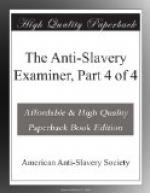Very respectfully, your friend,
FRANCIS JACKSON.
* * * * *
FROM MR. WEBSTER’S SPEECH AT NIBLO’S GARDENS.
“We have slavery, already, amongst us. The Constitution found it among us; it recognized it and gave it SOLEMN GUARANTIES. To the full extent of these guaranties we are all bound, in honor, in justice, and by the Constitution. All the stipulations, contained in the Constitution, in favor of the slaveholding States which are already in the Union, ought to be fulfilled, and so far as depends on me, shall be fulfilled, in the fullness of their spirit, and to the exactness of their letter."!!!
* * * * *
EXTRACTS FROM JOHN Q. ADAMS’S ADDRESS
AT NORTH BRIDGEWATER, NOV. 6, 1844.
The benefits of the Constitution of the United States, were the restoration of credit and reputation, to the country—the revival of commerce, navigation, and ship-building—the acquisition of the means of discharging the debts of the Revolution, and the protection and encouragement of the infant and drooping manufactures of the country. All this, however, as is now well ascertained, was insufficient to propitiate the rulers of the Southern States to the adoption of the Constitution. What they specially wanted was protection.—Protection from the powerful and savage tribes of Indians within their borders, and who were harassing them with the most terrible of wars—and protection from their own negroes—protection from their insurrections—protection from their escape—protection even to the trade by which they were brought into the country—protection, shall I not blush to say, protection to the very bondage by which they were held. Yes! it cannot be denied—the slaveholding lords of the South prescribed, as a condition of their assent to the Constitution, three special provisions to secure the perpetuity of their dominion over their slaves. The first was the immunity for twenty years of preserving the African slave-trade; the second was the stipulation to surrender fugitive slaves—an engagement positively prohibited by the laws of God, delivered from Sinai; and thirdly, the exaction fatal to the principles of popular representation, of a representation for slaves—for articles of merchandise, under the name of persons.
The reluctance with which the freemen of the North submitted to the dictation of these conditions, is attested by the awkward and ambiguous language in which they are expressed. The word slave is most cautiously and fastidiously excluded from the whole instrument. A stranger, who should come from a foreign land, and read the Constitution of the United States, would not believe that slavery or a slave existed within the borders of our country. There is not a word in the Constitution apparently bearing upon the condition of slavery, nor is there a provision but would be susceptible of practical execution, if there were not a slave in the land.




